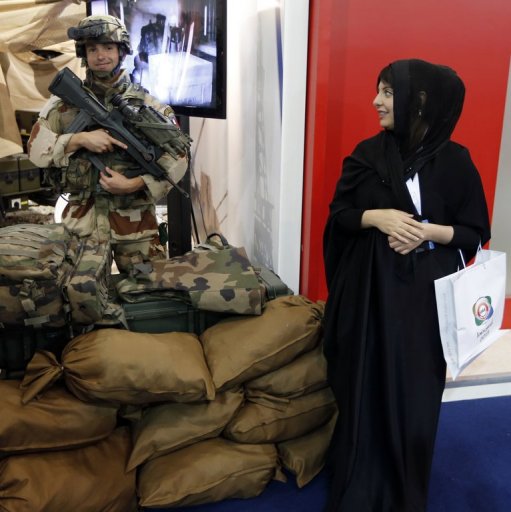Defence experts who say many lives could have been saved during Arab uprisings if states used proper crowd control measures sought to tap into a growing market at an Abu Dhabi arms fair.
Anti-riot vehicles with sophisticated acoustic repellents have boldly taken their place alongside the likes of Eurofighter’s Typhoon warplane and the bristling firepower of rocket launchers at the arms industry’s biennial quest for petrodollars in the Gulf emirate.
Riot-control specialists such as South Africa’s Paramount and Turkey’s Otokar are bidding to change an apparent regional mindset by exhibiting their wares at the IDEX arms fair.
Paramount’s Ivor Ichikowitz said governments need to be better equipped for crowd control to avoid resorting to use of disproportionate force.
From inside one such mobile fortress, police can repel rioters using acoustic repellents that emit ear-shattering frequencies over a 30-metre (yard) radius.
Adragna said anti-riot gear, which in addition to batons and shields includes shotguns, rubber bullets, tear gas and stun grenades, can maintain order.
Thousands have been killed in demonstrations that have swept across several Arab countries since December 2010 as security forces used overwhelming force against peaceful protesters demanding political change.
Street protests in Syria that began in March 2011 escalated into an armed conflict that the United Nations says has now killed more than 70,000 people.
Security forces in Bahrain, where an uprising was crushed in 2011, continue to use tear gas to quell regular Shiite protests and also use shotguns.
In Egypt, security forces under the Islamist government of President Mohamed Morsi appear to have reverted to the same heavy-handed practices used under toppled former strongman Hosni Mubarak.
Mauro Della Costanza of Italian shotgun maker Benelli says “Egypt is a big customer.
But he said that exports to some countries face delays, and sometimes complete bans, from Italian export authorities which investigate “how guns will be used.”
Tunisia, where violence erupted again this month two years after the first Arab Spring uprising, “is under a 100 percent embargo,” Della Costanza said.
Amnesty International has called on China, the United States and other arms exporting countries to ensure that weapons sold at this week’s fair do not lead to human rights abuses.
Brian Wood, Amnesty’s head of arms control and human rights, charged that commercial pressures were taking precedence over concerns for rights.

COMMENTS
Please let us know if you're having issues with commenting.